 |
| The streets of Praha. |
Our train arrived from Krakow at 745 AM. It was late leaving the night before, moving
one way to ditch a car, then changing directions altogether, before finally
making its way out to the Czech Republic. There was not a lot of sleep to be had. I had
not been for four years, Caroline since 1989.
Every time, I come I think of Mr Liang, my old history professor from
Vassar, who helped me think about Prague, the police, and the cycles of history
here, freedom from 1918-1938, annexation of the Sudetenland, war, independence
from 1945-48, the communist years of repression, the 1968 Prague Spring, 1989,
when a peaceful revolution transformed this land. It’s a space of hope for those of my
generation. “It’s a splendid beautiful city,” he used to say, “like Paris.”
But this comes with a caveat. Havel, the leader of the country, noted that
when they had nothing they had something to talk about, sometimes over hot
water, pretending it was tea. Once
Capitalism came, they had everything but the old conversations.
Arriving this time, we continued that feeling. Amidst the crowds converging to see the old
capital, we walked from the train station.
Caroline recalled arriving, the information booth giving her a
hotel. That December day of 1989, it was
like she was discovering a lost jewel. Today, the train station is a mall, full
of people in on the old secret.
Prague is a European capital, a part of the European
Economic Community, subject to all the whims and pressures of all these
spaces. But there is all that history
below the streets. It still lingers, always looking, reminding us, taking us to
a feeling, away from the US I feel more disengaged from. The cruelties of the US politics, our
leadership’s emulations of the rhetoric of Goebbels, the erosion of democracy
to the whims of capital.
In the US, I fight
but I also have to live my life, taking in the places and spaces I love. Its
good to be alive exploring this gem.
So we made our way to the river, greeting the curvy streets,
the ducks and morning, the sleep we did not get on the bumpy train the night
before, grasping at us now that we were here, as we walked over the Manesuv
Most to the Mali Strana.
Regrouping, we drank smoothies and stumbled into the Kafka
Museum, one of the most fascinating museums one can stumble into. Thinking about Kafka, its impossible not to
think about a world of writing. Marquez locked himself in his room when he
first read the Metamorphosis. George
Louis Borges suggested his friend, Max Broad, who disobeyed Kafka’s request to
burn his manuscripts on his death was one of the great literary heroes of the 20th
century.
So we walked into the old museum, showing black and white
footage of the Prague in which Kafka walked, the sound of a crow and old world
music. The horror of Krakow was still
there. We’d done pretty well for a few
days in Krakow, taking in our fears, and the beauty of the remains, the Klezmer
music, the knowledge that the Jews did survive.
But the horror of being encircled, walled in by forces of darkness, in a
ghetto by a wall that seemed to resemble to like gravestones, as if you were in
a cemetery, these feelings were hard to shake. Kafka seemed to write with a premonition,
aware of the stench in the air, the stigma, the association of Jews with blood
rituals that dated back centuries, reignited in 1899, when a young woman was
murdered and a Jew was blamed, fears of blood rituals re emerging. He seemed to
be aware the Jews were always the other, the dark, infectious Golem, the
boogyman chasing the small child.
Between the Town Square and its clock tower and his works to
school and work, Kafka felt caught.
“This small circle contains my life,” he wrote in his diary,
describing his life as a labyrinth, years before the magic realists borrowed from
this metaphor to reconsider their worlds on the outside, in relation to the
center, the individual strolling through the streets of the city, navigating
between what it real and what is thought, between themselves and a minotaur.
The agitated age with assassinations and dynamite, the anarchists
who snabbed Sisi in 1898, shot McKinley 1901, Plehve and Grand Duke Sergi in
1905, and the crescendo of violence of 1914, it tormented Kafka. So, he wrote
and thought about writing. “I am nothing but literature and want to be nothing
else.” He found a merging of creative
passion in this space. He went to theater and wrote about it. In the Town Square, he dreamed about imperial
purity and revolution staged simultaneously.
He loved and gravitated to women, but with ambivalence. He rejects Felice, Julie, and Milena, who
perished in Ravensbruck in 1944. “You
justify my anguish,” he wrote Millena.
She was his ‘fire.” But he rejected her, finally settling with Dora, his
last companion. One gets the feeling that he could never be happy.
A vegetarian for a short period, he wrote: “Its easy for
vegetarians, they eat their own flesh.”
Writing, he was more and more in touch with a human self-destructive
dementia.
“The war has lead us into a path into a labyrinth of
distorting mirrors. We stumble from one
fictitious vision to another bewildered visitations of false prophets and
characters, who with their cheap recipes for happiness, merely cover our eyes
and easy to that because of the mirrors we fall from one dudgeon to another.
Walking through the Kafka museum, its hard to shake the
memories of Krakow and the mythic struggle to liberate the town from the
clutches of the dragon. The dragon is vanquished. But it re emerges again and again.
We lock up our foes.
We lock ourselves up. Yet the penal colony extends through a century
of thinking. Kafka tried to get out of Prague.
The museum includes a copy of a mimeographed request, in duplicate. The system penalizes, containing us in a hall
of mirrors, surveilling us, as we look for directions to the castle.
We walk well into the afternoon. It’s a moody rainy afternoon in Prague. So we
make our way back to our room where we spend the rest of the afternoon, looking
at rooftops, napping. I make my way out
for a stroll exploring the beauty of the streets, later enjoying a beer with
the girls, looking at the rooftops, as the sun goes down. The city looms below,
music playing in the background, the sounds of the city everywhere. The memories of conversations we continue.
“I think I like Prague more than any of the other cities
we’ve visited,” muses number one.
“I am not charmed by it,” notes number two. “It looks like
another tourist city.”
The dialectic of the capitalistic city open up a
conversation about this spaces where dreams come true for a second. But what has it become? Around us, Europe is changing. Hungry seems to be embracing Russia, yet
again, even after the 45 years of occupation it enduring. For now Europe is holding. But amnesia is
everywhere, particularly in the US, where rhetoric is vengeful. But one can
find it here.
A young woman with a Unicef card asks for money. I give her
some.
“She wasn’t working for Unicef,” noted a woman by me. “She
was a gypsy.”
The hatred is everywhere.
People seem to fear that same old boogeyman.
 |
| On our way out of Krakow to the train for Praha. |


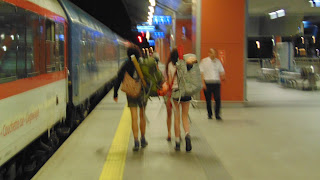













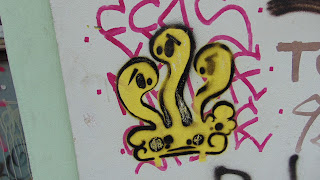
















































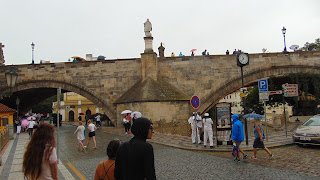











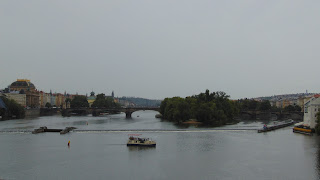

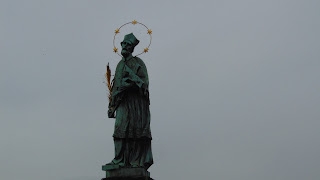




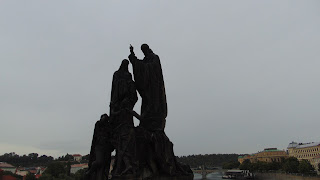














No comments:
Post a Comment